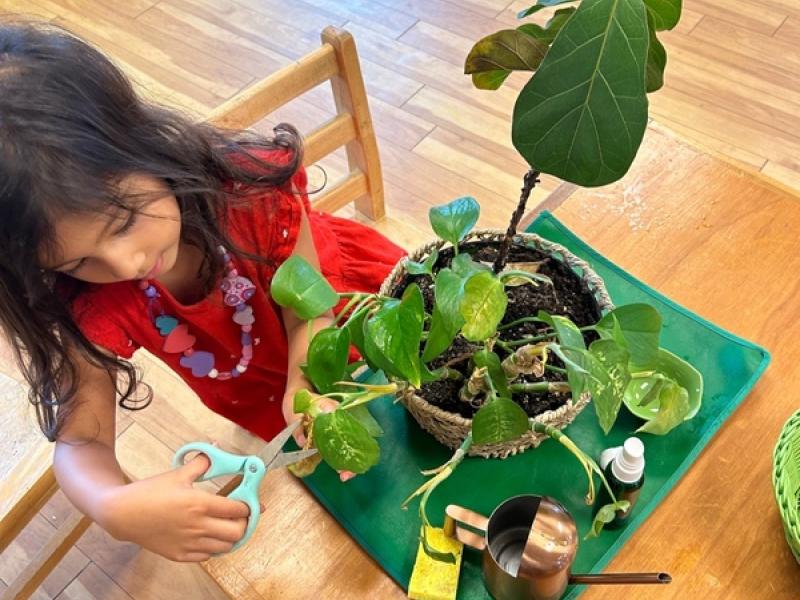It's worth emphasizing that Practical Life activities are essential for the development of our little ones.
It's easy (and natural) enough to pay attention to children's "academic" performance. However, Practical life activities are the foundation of the Montessori Methodology. They are the activities of everyday life and are involved in all aspects of life. They are of the most significant importance in assisting a child to reach their potential.
Some parents might think, "Why do I pay to have my children wash the table, water the plants, and even do some ironing?" In truth, all the activities in the Practical Life milieu lay the foundation for other areas of development for children.
Children gain independence through Practical Life activities. These activities are designed to enable children to work with little or no help from adults. When a child chooses to juice an orange, they carry the tray to their table, sit down, and start juicing. They finish and enjoy their hard work. They then carry one item at a time to the sink until they finish cleaning the materials, which they then put back on the shelf. During this process, they gradually develop independence.
Concentration is strengthened in Practical Life activities. Some of the activities consist of dozens of steps. When washing a table, the child lays out every material on the placemat, then wets the table, soaps it, brushes it, and wipes it in precise, logical order. All of these steps require the child to concentrate.
Indirect preparation for reading and writing is interwoven with the Practical Life activities. Children use a pincer grip when handling materials with knobs in the classroom, which is essential for pencil grip later on. Materials are placed from left to right as a proto-reading practice.
Children are drawn and attracted to work with the Practical Life materials. Let's look at some of the distinguishing characteristics of Practical Life activities:
- Reality-based: These are activities the children will encounter in daily life. Children sweep, sew a button, water the plants, and even iron.
- Limited in quantity: Encourages children to exert patience, decisiveness, grace, and courtesy.
- Logical sequence: All the activities follow a specific logical sequence. The child takes out the materials from the shelf, finishes the work, and cleans up, then puts materials back in the same spot for the next child to work with.
- Child-sized and natural materials: All the materials are child-sized and made with natural materials. They sweep with a broom proportioned appropriately to them and cut with a knife that fits their small hands comfortably; they use glass instead of plastic cups. Glass breaks, so the child must move carefully and carefully handle it.
- Orderly: The materials are placed in the same spot, and the child knows where to start and puts them back in the original place when they finish.
Children want to copy or do what they see the adults in their lives doing. This is why your child probably asks you repeatedly if they can help you wash the car, do the dishes, try on your shoes or clothes, help you cook, dress themselves, etc. Maria Montessori said, "Imitation is the first instinct of the awakening mind."
Children strive to be helpful in their family environment from a young age. They want to make a difference and contribute. Even if they are still developing many skills, they need to be allowed to practice. Beyond the classroom, the parent should not fear exposing a child to a reasonable degree of practical education and responsibility; there is nothing quite like the renewed purpose of a child who has discovered a power they hadn't known before.
There are some activities you can incorporate with your child at home:
- Set up the table at dinner time (try to place the plates, cups, and utensils on the lower shelf so your child can exert complete independence
- Prepare their lunch for school the next day
- Clean up spills (prepare a child-sized broom and dustpan if possible
- Plant seeds in the planters or garden
As mentioned in an article by Guide Post Montessori, Maria Montessori once observed that children are happiest when they are engaged in real-life, ordinary Practical Life activities. Children enjoy having the responsibility of wiping down tables, watering the plants, being part of preparing meals and cleaning up afterward. Help your child by being self-sufficient at home and you will see them thrive.
-Grasshopper Teacher


